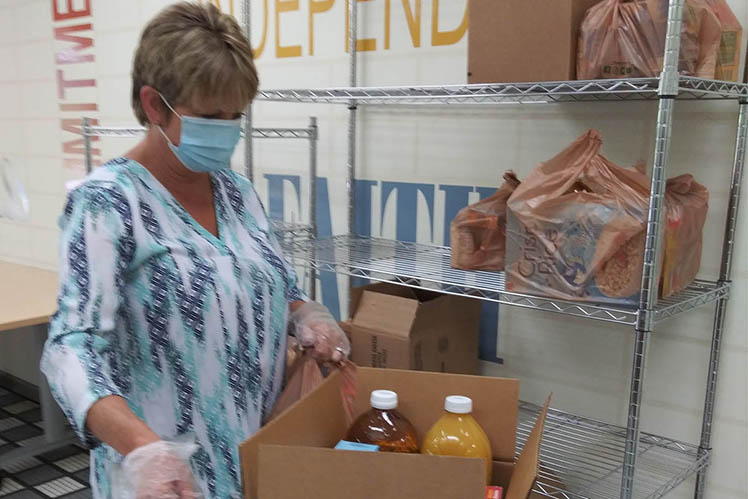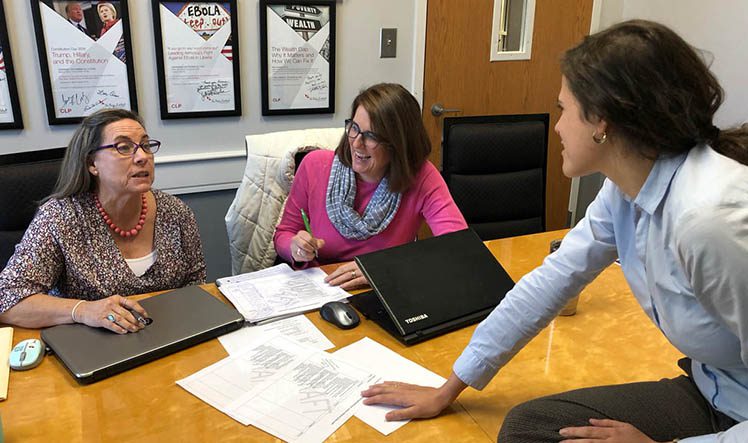All Blog Posts
How Foothills Family Resources is Adapting to Meet Community Need in the Era of COVID-19
The Riley Institute’s Planning and Evaluation Capacity Building Initiative (PECBI) empowers nonprofit organizations to foster a culture of organizational learning around data and evaluation. As community needs grow due to the pandemic, we’re asking our PECBI partners what they’ve learned as they’ve adapted their services in this challenging time. In the first installment of our new Q&A series, Impact in the Era of COVID-19, we speak with Foothills Family Resources Executive Director Marilyn Neves.
Published July 6, 2020
This interview has been edited for clarity and brevity.
See all Impact in the Era of COVID-19 interviews
For those who don’t know, tell us a bit about what Foothills Family Resources does and who it serves.
We are the sole provider of resources in northern Greenville County to an underserved population beset by generational poverty, lack of transportation, high unemployment rates, low graduation rates, and poor healthcare — issues all magnified by the pandemic. Our clients receive professional services in our facility from a diverse group of agencies including Greenville Mental Health, Sunbelt Human Advancement Resources, the South Carolina Vocational Rehabilitation Department, the Department of Health and Environmental Control, the Department of Social Services, and Greenville County Schools.
What community needs has Foothills Family Resources identified as a result of COVID-19, and have they changed over the course of the pandemic?
In the early weeks of the pandemic and statewide shutdown, we had more requests than ever for food. The shortage spurred a fear among some that they wouldn’t be able to have enough to feed their families in the long-term. This is our busiest service, and we have changed our pantry rules so that individuals can come every two weeks rather than once a month. We also have seen an increase in SNAP [Supplemental Nutrition Assistance Program] applications and questions regarding the service. This is a program organized by the Department of Social Services, but we provide intake and processing at our office. This has been a blessing to those who have recently lost their jobs or had their hours cut.
In addition, there has been an increased need in the past two weeks for rent and utility assistance. Protections against evictions and utility disconnections were lifted in early June after being in place for two months. So now, our clients not only have bills due from March but also April, May, and in some cases, June.
Unfortunately, none of our partner agencies have been on site since mid-March, when the shutdown was ordered. This is most unfortunate for our clients who see our mental health counselors. As people are forced to shelter at home for a long period of time, our mental health clients are struggling. Our counselors are now conducting phone sessions with existing clients, which helps.

Intake Coordinator Gina Hinton packs boxes of food to provide clients inside the pantry at Foothills Family Resources.
Are you undertaking any new initiatives to meet the community’s needs during the pandemic?
We volunteered and have been accepted as a satellite site for the South Carolina Department of Employment and Workforce (DEW), which allows us to provide the ability to sign up for unemployment at our office. Our staff is trained, and there will be a computer designated for just this service. Some clients have expressed difficulty when navigating the DEW website themselves, so this will make a huge impact and help ensure they get signed up efficiently.
We recently hosted a “Bag a Bargain Sale” for anyone in our area. For $5, each person received two large bags which could be filled with donated clothing from our Center for Working Families Closet. The $5 charge allowed participants to feel like they were investing in something rather than receiving charity. When they checked out, every person received a ticket that they could redeem for a free lunch from two local food trucks we had at the event. It was a great opportunity to talk to everyone in a different setting and to let our clients get to know our staff better.
We have also started talks with our local Child Development Center to possibly become a satellite location for them. We housed the Head Start Program several years back and can still accommodate a small childcare program. Childcare has always been an issue, along with transportation, for our clients and students. We hope to be able to offer this service to support them.

Marilyn Neves and Kristen Mullis of Foothills Family Resources meet with Sally Morris Cote, Director of the Planning and Evaluation Capacity Building Initiative at the Riley Institute. Photo taken prior to the pandemic.
Are there any changes that you’ve made to your programs that you might consider integrating in the long-term, even once COVID-19 is behind us?
This time of change has given us the opportunity to think more creatively about all of our programs and how we can be better prepared in the future for something as life-altering as the pandemic has been.
We are trying to add as many services to our office as possible to eliminate the need for our clients to have to make a trip to Greenville. To access the help they need, the majority of our clients have to pay someone to drive and wait on them. We hope to continue our partnership with DEW and would like to be able to offer help with Social Security questions, applications, and so forth.
What’s been your biggest takeaway from this moment we’re in?
We have learned that our community is filled with some of the most resilient yet humble people in the world. That motivates us to constantly work to find ways to make life a little easier for them.